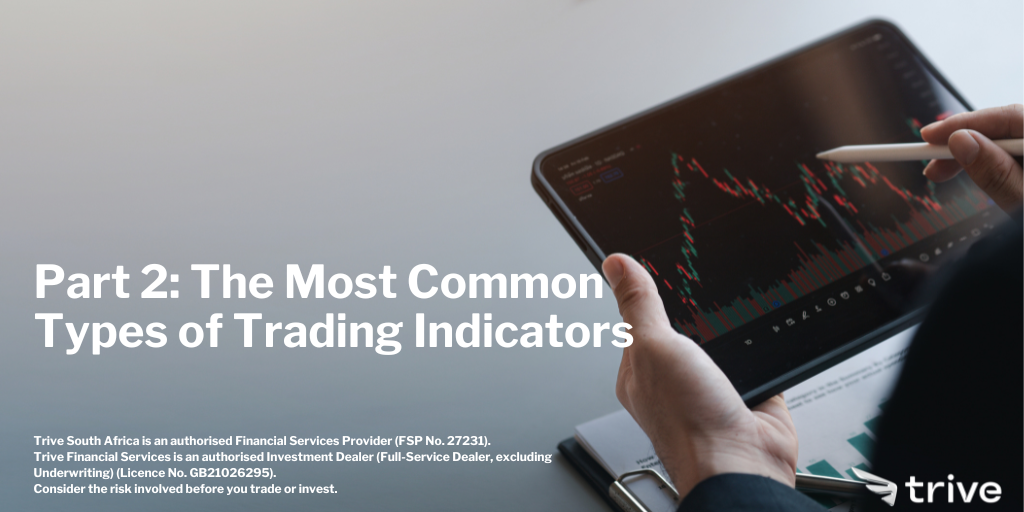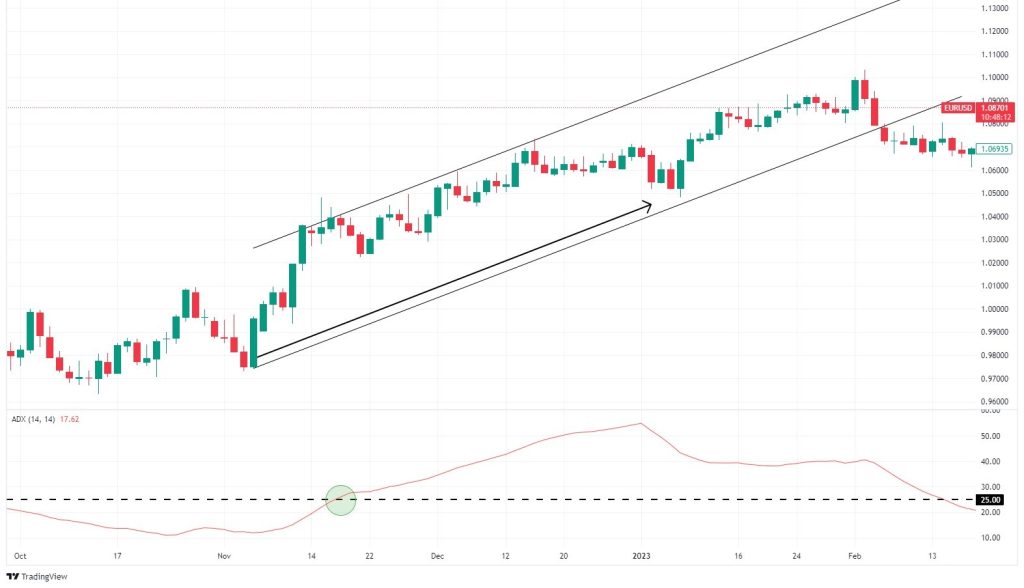
Trading indicators serve a vital function in aiding traders by offering valuable insights into market trends, momentum, volatility, and possible entry or exit points.
Traders frequently utilize a blend of these indicators to confirm signals and make informed decisions. Understanding the strengths and limitations of each indicator is crucial, along with comprehending how they complement diverse trading strategies and adjust to varying market conditions. Let’s explore some frequently utilized types in the realm of momentum indicators.
- Momentum Indicators:
- Relative Strength Index
The Relative Strength Index (RSI) is among some of the most popular indicators in the world of trading, shedding light on potential market conditions.
This oscillator, ranging from 0 to 100, assesses the magnitude of recent price changes, signalling potential overbought conditions when above 70 and possible oversold when below 30. In the world of trading, the RSI aligns with the concept that markets tend to correct themselves after extreme movements, emphasizing the importance of identifying these conditions for strategic decision-making.
For traders, the RSI unveils potential entry or exit points, acting as a compass for market extremes. For instance, when the RSI pierces the overbought threshold, it could hint at a possible trading opportunity for a downturn; conversely, diving into oversold territory might signify an impending upturn. Yet, it’s crucial to remember that the RSI doesn’t prophesize future prices but guides traders in navigating the ebb and flow of market sentiment, enriching their strategic arsenal.

- Stochastic Oscillator
The Stochastic Oscillator, a pivotal momentum indicator, plays a vital role in deciphering market dynamics. This oscillator assesses the closing price relative to the high-low range over a set period, typically 14 periods. With values ranging from 0 to 100, it identifies potential reversal points and gauges overbought or oversold conditions.
The Stochastic Oscillator aligns with the notion that markets often experience corrections after extreme price movements. A potential downward correction might be anticipated when the indicator surpasses 80, signalling overbought conditions. Conversely, readings below 20 suggest oversold conditions, hinting at a possible upward correction.
In the ever-changing landscape of finance, the Stochastic Oscillator empowers traders with insights into momentum shifts, guiding their strategic decisions. As it doesn’t forecast prices but evaluates the current strength of a trend, traders can leverage this information to navigate market fluctuations with greater precision.

- Average Directional Index (ADX)
The Average Directional Index (ADX) can be used to understand market momentum. This indicator, typically on a scale of 0 to 100, assesses the strength of a trend without delving into its direction. A reading above 25 implies a strong trend, while values below 20 suggest a lack of a clear trend.
The ADX aligns with the theory that sustained trends often precede significant price movements. As markets oscillate between periods of direction and consolidation, ADX becomes an indispensable tool.
When coupled with directional indicators like the Positive Directional Index (DI+) and Negative Directional Index (DI-), ADX can guide traders to potential trend shifts, enhancing their strategic decisions in navigating the complexities of financial markets. In the grand scheme of trading, the ADX stands as a reliable ally, offering traders a compass to navigate the sometimes tumultuous waters of market momentum.

Summary
In conclusion, mastering momentum indicators like RSI, Stochastic Oscillator, and ADX equips traders with invaluable tools to navigate market dynamics. Understanding these indicators enhances traders’ ability to make informed decisions at key technical levels, fostering a strategic edge in the dynamic world of trading.
Sources: Corporate Finance Institute, Investopedia, TradingView
Piece Written By Nkosilathi Dube, Trive Financial Market Analyst
Disclaimer: Trive South Africa (Pty) Ltd (hereinafter referred to as “Trive SA”), with registration number 2005/011130/07, is an authorised Financial Services Provider in terms of the Financial Advisory and Intermediary Services Act, 37 of 2002. Trive SA is authorised and regulated by the South African Financial Sector Conduct Authority (FSCA) and holds FSP number 27231. Trive Financial Services Ltd (hereinafter referred to as “Trive MU”) holds an Investment Dealer (Full-Service Dealer, excluding Underwriting) Licence with licence number GB21026295 pursuant to section 29 of the Securities Act 2005, Rule 4 of the Securities Rules 2007, and the Financial Services Rules 2008. Trive MU is authorized and regulated by the Mauritius Financial Services Commission (FSC) and holds Global Business Licence number GB21026295 under Section 72(6) of the Financial Services Act. Trive SA and Trive MU are collectively known and referred to as “Trive Africa”.
Market and economic conditions are subject to sudden change which may have a material impact on the outcome of financial instruments and may not be suitable for all investors. Trive Africa and its employees assume no liability for any loss or damage (direct, indirect, consequential, or inconsequential) that may be suffered. Please consider the risks involved before you trade or invest. All trades on the Trive Africa platform are subject to the legal terms and conditions to which you agree to be bound. Brand Logos are owned by the respective companies and not by Trive Africa. The use of a company’s brand logo does not represent an endorsement of Trive Africa by the company, nor an endorsement of the company by Trive Africa, nor does it necessarily imply any contractual relationship. Images are for illustrative purposes only and past performance is not necessarily an indication of future performance. No services are offered to stateless persons, persons under the age of 18 years, persons and/or residents of sanctioned countries or any other jurisdiction where the distribution of leveraged instruments is prohibited, and citizens of any state or country where it may be against the law of that country to trade with a South African and/or Mauritius based company and/or where the services are not made available by Trive Africa to hold an account with us. In any case, above all, it is your responsibility to avoid contravening any legislation in the country from where you are at the time.
CFDs and other margin products are complex instruments and come with a high risk of losing money rapidly due to leverage. You should consider whether you understand how these products work and whether you can afford to take the high risk of losing your money. Professional clients can lose more than they deposit. See our full Risk Disclosure and Terms of Business for further details. Some or all of the services and products are not offered to citizens or residents of certain jurisdictions where international sanctions or local regulatory requirements restrict or prohibit them.




